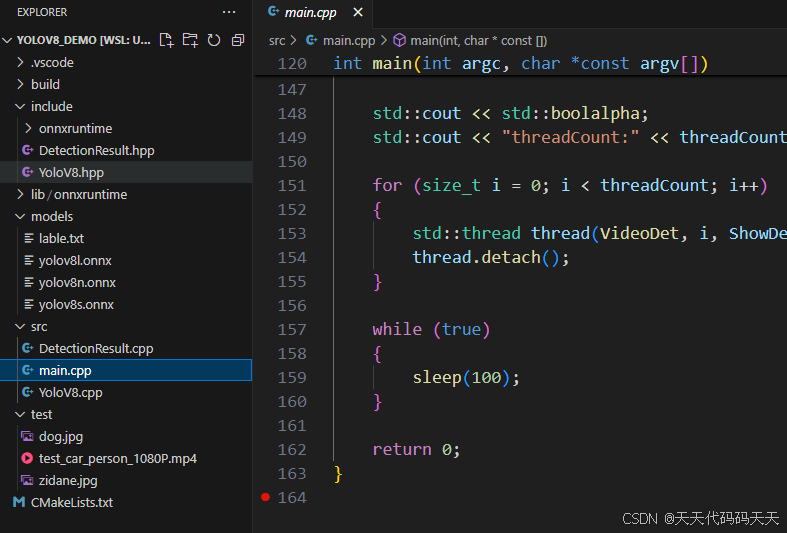linux C++ onnxruntime yolov8 视频检测Demo

目录
项目目录

效果
./yolov8_demo --help

./yolov8_demo -c=2 -p=true
./yolov8_demo -c=1 -s=true
CMakeLists.txt
# cmake needs this line
cmake_minimum_required(VERSION 3.0)
# Define project name
project(yolov8_demo)
# Release模式下的编译指令
# SET(CMAKE_BUILD_TYPE "Release")
# set(CMAKE_C_FLAGS_RELEASE "${CMAKE_C_FLAGS_RELEASE} -s")
# set(CMAKE_CXX_FLAGS_RELEASE "${CMAKE_CXX_FLAGS_RELEASE} -std=c++17 -pthread -Wall -Wl")
# Debug模式下的编译指令
SET(CMAKE_BUILD_TYPE "Debug")
set(CMAKE_C_FLAGS_RELEASE "${CMAKE_C_FLAGS_DEBUG}")
set(CMAKE_CXX_FLAGS_DEBUG "${CMAKE_CXX_FLAGS_DEBUG} -std=c++17 -pthread")
set(OpenCV_LIBS opencv_videoio opencv_imgcodecs opencv_imgproc opencv_core opencv_dnn opencv_highgui)
include_directories(
/usr/local/include/opencv4
${PROJECT_SOURCE_DIR}/include
${PROJECT_SOURCE_DIR}/include/onnxruntime
)
link_directories(
${PROJECT_SOURCE_DIR}/lib/onnxruntime # 第三方动态库文件
/usr/local/lib/
)
#递归指定源码的路径
file(GLOB_RECURSE SRCS ${PROJECT_SOURCE_DIR}/src/*.cpp)
# Declare the executable target built from your sources
add_executable(yolov8_demo ${SRCS})
# Link your application with OpenCV libraries
target_link_libraries(yolov8_demo
-lonnxruntime
${OpenCV_LIBS}
)代码
main.cpp
#include <opencv2/core.hpp>
#include <opencv2/highgui.hpp>
#include <iostream>
#include <YoloV8.hpp>
#include <unistd.h>
#include <sys/syscall.h>
#include <thread>
int VideoDet(int index, bool showDet, bool useGPU, bool printPerStepInfo)
{
size_t threadId = static_cast<size_t>(syscall(SYS_gettid));
// std::cout << "index:" << index << " thread id: " << threadId << std::endl;
cv::VideoCapture capture("./test/test_car_person_1080P.mp4");
// 检查视频是否成功打开
if (!capture.isOpened())
{
std::cout << "无法读取视频文件" << std::endl;
return -1;
}
int frameCount = capture.get(cv::CAP_PROP_FRAME_COUNT); // 获取视频帧数
double fps = capture.get(cv::CAP_PROP_FPS); // 获取帧率
int delay = int(1000 / fps); // 根据帧率计算帧间间隔时间
// delay=1;
std::string model_path = "./models/yolov8n.onnx";
std::string lable_path = "./models/lable.txt";
int GPUCount = 2;
int device_id = 0;
if (index >= GPUCount)
{
device_id = index % GPUCount;
}
else
{
device_id = index;
}
// device_id=0;
YoloV8 yoloV8(model_path, lable_path, useGPU, device_id);
yoloV8.index = index;
yoloV8.threadId = threadId;
yoloV8.videoFps = fps;
yoloV8.frameCount = frameCount;
// std::cout << "device_id:" << yoloV8.device_id << std::endl;
// vector<DetectionResult> detectionResult;
// Mat frame=cv::imread("../test/dog.jpg");
// yoloV8.Detect(frame, detectionResult);
// std::cout << "detectionResult size:" << detectionResult.size() << std::endl;
string winname = "detectionResult-" + std::to_string(index);
while (true)
{
double start = (double)cv::getTickCount();
delay = int(1000 / fps);
Mat frame;
bool success = capture.read(frame); // 读取一帧数据
// 检查是否成功读取帧
if (!success)
{
std::cout << "index:" << index << ",读取完毕" << std::endl;
yoloV8.PrintAvgCostTime();
break;
}
vector<DetectionResult> detectionResult;
yoloV8.Detect(frame, detectionResult);
// std::cout <<"index:"<<index<< " thread id: " << threadId << " detectionResult size: " << detectionResult.size() << std::endl;
yoloV8.detectionResultSize = detectionResult.size();
if (printPerStepInfo)
{
yoloV8.PrintCostTime();
yoloV8.PrintAvgCostTime();
}
if (showDet)
{
yoloV8.Draw(frame, detectionResult);
imshow(winname, frame);
double costTime = ((double)getTickCount() - start) / getTickFrequency();
delay = delay - costTime;
if (delay <= 0)
{
delay = 1;
}
if (waitKey(delay) == 27) // 通过按下ESC键退出循环
{
break;
}
}
}
capture.release(); // 释放视频对象
if (showDet)
{
cv::destroyWindow(winname);
}
return 0;
}
int main(int argc, char *const argv[])
{
int threadCount = 1;
bool showDet = false;
bool useGPU = false;
bool printPerStepInfo = true;
const char *keys ="{h help || print this message}"
"{c threadCount | 1 | run thread number}"
"{s showDet | false | show detection result}"
"{g useGPU | false | use GPU}"
"{p printPerStepInfo | false | print per Step Info}";
cv::CommandLineParser parser(argc, argv, keys);
if(parser.has("help"))
{
parser.about("YoloV8 demo v1.0.0");
parser.printMessage();
return 0;
}
threadCount=parser.get<int>("threadCount");
showDet=parser.get<bool>("showDet");
useGPU=parser.get<bool>("useGPU");
printPerStepInfo=parser.get<bool>("printPerStepInfo");
std::cout << std::boolalpha;
std::cout << "threadCount:" << threadCount << ",showDet:" << showDet<< ",useGPU:" << useGPU << ",printPerStepInfo:" << printPerStepInfo << std::endl;
for (size_t i = 0; i < threadCount; i++)
{
std::thread thread(VideoDet, i, showDet, useGPU, printPerStepInfo);
thread.detach();
}
while (true)
{
sleep(100);
}
return 0;
}
#include <opencv2/core.hpp>
#include <opencv2/highgui.hpp>
#include <iostream>
#include <YoloV8.hpp>
#include <unistd.h>
#include <sys/syscall.h>
#include <thread>
int VideoDet(int index, bool showDet, bool useGPU, bool printPerStepInfo)
{
size_t threadId = static_cast<size_t>(syscall(SYS_gettid));
// std::cout << "index:" << index << " thread id: " << threadId << std::endl;
cv::VideoCapture capture("./test/test_car_person_1080P.mp4");
// 检查视频是否成功打开
if (!capture.isOpened())
{
std::cout << "无法读取视频文件" << std::endl;
return -1;
}
int frameCount = capture.get(cv::CAP_PROP_FRAME_COUNT); // 获取视频帧数
double fps = capture.get(cv::CAP_PROP_FPS); // 获取帧率
int delay = int(1000 / fps); // 根据帧率计算帧间间隔时间
// delay=1;
std::string model_path = "./models/yolov8n.onnx";
std::string lable_path = "./models/lable.txt";
int GPUCount = 2;
int device_id = 0;
if (index >= GPUCount)
{
device_id = index % GPUCount;
}
else
{
device_id = index;
}
// device_id=0;
YoloV8 yoloV8(model_path, lable_path, useGPU, device_id);
yoloV8.index = index;
yoloV8.threadId = threadId;
yoloV8.videoFps = fps;
yoloV8.frameCount = frameCount;
// std::cout << "device_id:" << yoloV8.device_id << std::endl;
// vector<DetectionResult> detectionResult;
// Mat frame=cv::imread("../test/dog.jpg");
// yoloV8.Detect(frame, detectionResult);
// std::cout << "detectionResult size:" << detectionResult.size() << std::endl;
string winname = "detectionResult-" + std::to_string(index);
while (true)
{
double start = (double)cv::getTickCount();
delay = int(1000 / fps);
Mat frame;
bool success = capture.read(frame); // 读取一帧数据
// 检查是否成功读取帧
if (!success)
{
std::cout << "index:" << index << ",读取完毕" << std::endl;
yoloV8.PrintAvgCostTime();
break;
}
vector<DetectionResult> detectionResult;
yoloV8.Detect(frame, detectionResult);
// std::cout <<"index:"<<index<< " thread id: " << threadId << " detectionResult size: " << detectionResult.size() << std::endl;
yoloV8.detectionResultSize = detectionResult.size();
if (printPerStepInfo)
{
yoloV8.PrintCostTime();
yoloV8.PrintAvgCostTime();
}
if (showDet)
{
yoloV8.Draw(frame, detectionResult);
imshow(winname, frame);
double costTime = ((double)getTickCount() - start) / getTickFrequency();
delay = delay - costTime;
if (delay <= 0)
{
delay = 1;
}
if (waitKey(delay) == 27) // 通过按下ESC键退出循环
{
break;
}
}
}
capture.release(); // 释放视频对象
if (showDet)
{
cv::destroyWindow(winname);
}
return 0;
}
int main(int argc, char *const argv[])
{
int threadCount = 1;
bool showDet = false;
bool useGPU = false;
bool printPerStepInfo = true;
const char *keys ="{h help || print this message}"
"{c threadCount | 1 | run thread number}"
"{s showDet | false | show detection result}"
"{g useGPU | false | use GPU}"
"{p printPerStepInfo | false | print per Step Info}";
cv::CommandLineParser parser(argc, argv, keys);
if(parser.has("help"))
{
parser.about("YoloV8 demo v1.0.0");
parser.printMessage();
return 0;
}
threadCount=parser.get<int>("threadCount");
showDet=parser.get<bool>("showDet");
useGPU=parser.get<bool>("useGPU");
printPerStepInfo=parser.get<bool>("printPerStepInfo");
std::cout << std::boolalpha;
std::cout << "threadCount:" << threadCount << ",showDet:" << showDet<< ",useGPU:" << useGPU << ",printPerStepInfo:" << printPerStepInfo << std::endl;
for (size_t i = 0; i < threadCount; i++)
{
std::thread thread(VideoDet, i, showDet, useGPU, printPerStepInfo);
thread.detach();
}
while (true)
{
sleep(100);
}
return 0;
}